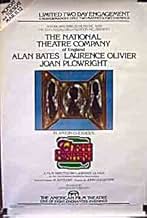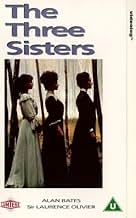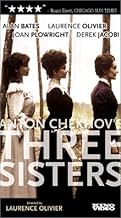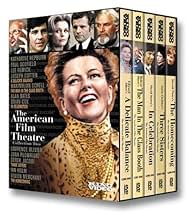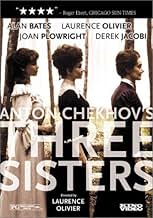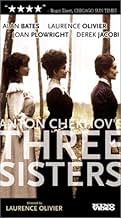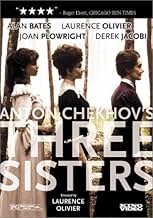Nearly a thousand miles away from their beloved Moscow, Chekhov's Three Sisters live in virtual exile. Olga, a schoolmistress, attempts to support her siblings and the home that is the sole ... Read allNearly a thousand miles away from their beloved Moscow, Chekhov's Three Sisters live in virtual exile. Olga, a schoolmistress, attempts to support her siblings and the home that is the sole legacy of their late father.Nearly a thousand miles away from their beloved Moscow, Chekhov's Three Sisters live in virtual exile. Olga, a schoolmistress, attempts to support her siblings and the home that is the sole legacy of their late father.
- Directors
- Writers
- Stars
- Directors
- Writers
- All cast & crew
- Production, box office & more at IMDbPro
6.3546
1
2
3
4
5
6
7
8
9
10
Featured reviews
Small Town Girls
This fourth and final feature film directed by Laurence Olivier is his only one not based on Shakespeare or with himself in the title role. Itself now fifty years old, hence the startlingly youthful appearances of National Theatre alumni like Derek Jacobi and Sheila Reid as Andrei and his wife Natasha.
Described by Olivier as "a celebration of the acting rather than a thoroughly conceived filmic version of the play", the settings and groupings often resemble those of a German silent film while the costumes anticipate Bergman's 'Cries and Whispers'. Olivier's camera however glides about the set and cuts in lively pursuit of the Prosorov sisters as they dream their dreams of Moscow's bright lights.
Described by Olivier as "a celebration of the acting rather than a thoroughly conceived filmic version of the play", the settings and groupings often resemble those of a German silent film while the costumes anticipate Bergman's 'Cries and Whispers'. Olivier's camera however glides about the set and cuts in lively pursuit of the Prosorov sisters as they dream their dreams of Moscow's bright lights.
The best "Three sisters" I've ever seen
Having a Russian background, I saw many productions of one of the most famous Chekhov's plays. I'd say the Olivier's "Three sisters" is the best of all I've ever seen. Even if there are some inaccuracies in details related to the Russian 19th century realities, the Olivier's n-depth understanding of the complicated Chekhov's work is amazing.
Fine Chekhov Filmization
It is remarkable how deeply interesting and moving is Chekhov's play about a small-town Russian family, longing to move to Moscow. Yet the playwright crafts with such affection and love for his characters that the viewer is hypnotized by the unfoldment.
With a production obviously based on a beautiful stage production, Laurence Olivier co-directs with John Sickel a most engrossing presentation.
Among the outstanding cast, Joan Plowright's Masha, Alan Bates' Col. Vershinin, and Olivier's Dr. Chebutikin are outstanding. The beautiful cinematography by Geoffrey Unsworth apparently utilize much of the stage sets, yet they merely add to the overall effectiveness.
Few cuts are made, as the production offers a comprehensive view of this work. Part of the American Film Theatre's series of 1970, "The Three Sisters" is a memorable experience. One longs for a re-release of this fine achievement.
With a production obviously based on a beautiful stage production, Laurence Olivier co-directs with John Sickel a most engrossing presentation.
Among the outstanding cast, Joan Plowright's Masha, Alan Bates' Col. Vershinin, and Olivier's Dr. Chebutikin are outstanding. The beautiful cinematography by Geoffrey Unsworth apparently utilize much of the stage sets, yet they merely add to the overall effectiveness.
Few cuts are made, as the production offers a comprehensive view of this work. Part of the American Film Theatre's series of 1970, "The Three Sisters" is a memorable experience. One longs for a re-release of this fine achievement.
Excellent production
Caught this on Talking Pictures and was really impressed. I have seen the play before on stage and think of it as a dreary piece, but this version has changed my opinion. It is the most naturalistic performanceI I have ever seen Laurence Olivier do. There is a lovely performance by Louise Purnell who I recently caught during lockdown when I dug out an old box set of Forsyte Saga. It was also interesting to see a very young Ronald Pickup and Derek Jacobi. I was most impressed. Additionally it was good to see the excellent Alan Bates who had replaced Robert Stephens who was ill. Some reviews mention poor sound but everything was clear and there were no problems,
The calm before the storm.
Laurence Olivier was justifiably proud of his National Theatre company and this film is essentially a showcase, designed to replicate the type of ensemble playing for which Stanislavski's Moscow Art Theatre was renowned. It was there that Chekhov's 'Three Sisters' was first performed in 1901 with his wife Olga Knipper in the role of Masha.
Olivier's fortunes had been in decline of late with dwindling Old Vic audiences, the theatrical disasters wrought by Kenneth Tynan and the toll taken on his health by overwork.
You cannot keep a good man down of course and he summoned up sufficient strength, energy and technique to both direct this and reprise his role of the amiable army surgeon Chebutikin. The cast from the stage production remains the same with the exception of Alan Bates as Vershinin who has been drafted in to replace an ailing Robert Stephens.
The entire cast is simply splendid but of course Olivier, Bates and Joan Plowright as Masha possess that indefinable 'something' which sets them apart.
Watching this piece always calls to mind Gershwin's lyric "More skies of grey than any Russian play can guarantee." There are various sub-plots here but the main theme is the failure of two of the sisters to ever realise their dream of going to Moscow. Irina doesn't really love Tusenbach but will marry him anyway which makes their parting when he goes off to fight a duel even more poignant. Masha and Vershinin are fated never to be together whilst Natasha is resigned to a life with lapdog Andrei.
Positivity abounds however with Tusenbach talking excitably about a healthy storm arising and Vershinin seeming to think that wars are a thing of the past! Cruelly ironic of course with WW1 a few years away not to mention another peak of human insanity known as the Russian revolution.
This is a studio version of a stage production which by its very nature falls between two stools and cannot be wholly satisfactory but it is lovingly made and this piece, as with all of the plays of Chekhov, who declared that 'a writer must be humane to his fingertips', will never cease to cast its spell. Moura Budberg is an ideal choice as adaptor and had previously worked on 'The Seagull' of Sidney Lumet. Mention must be made of the lovely score by William Walton, without which no film directed by Olivier would be complete.
The film was not the success for which Olivier had hoped but bearing in mind the attention span and literacy level of the average cinema-goer one is hardly surprised.
Olivier's fortunes had been in decline of late with dwindling Old Vic audiences, the theatrical disasters wrought by Kenneth Tynan and the toll taken on his health by overwork.
You cannot keep a good man down of course and he summoned up sufficient strength, energy and technique to both direct this and reprise his role of the amiable army surgeon Chebutikin. The cast from the stage production remains the same with the exception of Alan Bates as Vershinin who has been drafted in to replace an ailing Robert Stephens.
The entire cast is simply splendid but of course Olivier, Bates and Joan Plowright as Masha possess that indefinable 'something' which sets them apart.
Watching this piece always calls to mind Gershwin's lyric "More skies of grey than any Russian play can guarantee." There are various sub-plots here but the main theme is the failure of two of the sisters to ever realise their dream of going to Moscow. Irina doesn't really love Tusenbach but will marry him anyway which makes their parting when he goes off to fight a duel even more poignant. Masha and Vershinin are fated never to be together whilst Natasha is resigned to a life with lapdog Andrei.
Positivity abounds however with Tusenbach talking excitably about a healthy storm arising and Vershinin seeming to think that wars are a thing of the past! Cruelly ironic of course with WW1 a few years away not to mention another peak of human insanity known as the Russian revolution.
This is a studio version of a stage production which by its very nature falls between two stools and cannot be wholly satisfactory but it is lovingly made and this piece, as with all of the plays of Chekhov, who declared that 'a writer must be humane to his fingertips', will never cease to cast its spell. Moura Budberg is an ideal choice as adaptor and had previously worked on 'The Seagull' of Sidney Lumet. Mention must be made of the lovely score by William Walton, without which no film directed by Olivier would be complete.
The film was not the success for which Olivier had hoped but bearing in mind the attention span and literacy level of the average cinema-goer one is hardly surprised.
Did you know
- TriviaThis was one of two British made adaptations of Anton Chekhov's 1900 play "Three Sisters" released in 1970. The other was The Three Sisters (1970).
- Quotes
Ferrapont the watchman: What are papers for, if not to be signed?
- ConnectionsFeatured in Tea With the Dames (2018)
- How long is Three Sisters?Powered by Alexa
Details
- Runtime
- 2h 45m(165 min)
- Sound mix
- Aspect ratio
- 1.85 : 1
Contribute to this page
Suggest an edit or add missing content


